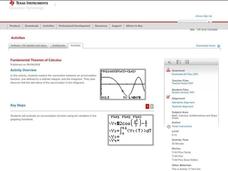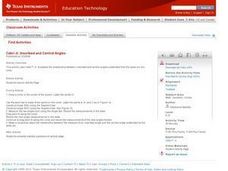Curated OER
Fundamental Theorem of Calculus
High schoolers, with the assistance of their TI-84 Plus / TI-83 Plus calculators, explore and assess the connections between an accumulation function, one defined by a definite integral, and the integrand. They summarize that the...
Curated OER
Exploring the Area Under a Curve
Using TI-89, mathematicians explore and investigate Riemann sums to estimate the area under the graphs of intervals by drawing and illustrating rectangles. They review and practice the concepts of summation notation and area formulas to...
Texas Instruments
Listen and Line Up
High schoolers practice the derivative using an interactive activity. In this calculus lesson they explore the derivative by playing a game. Each student gets a turn at being the caller.
Curated OER
Implicit Differentiation
Pupils explore the concept of derivatives. They use implicit differentiation to determine points on a graph where a tangent line is horizontal, vertical, or oblique. Finally, learners find the derivative of a polynomial by...
Curated OER
Investigation the Derivatives of Some Common Functions
High schoolers investigate the derivative of a function. In this calculus lesson, students explore the derivatives of sine, cosine, natural log, and natural exponential functions. The lesson promotes the idea of the derivative as a...
Curated OER
Symbolic Math Guid App
High schoolers explore problem solving with the TI-89 or Voyage 200. In this secondary mathematics lesson plan, your learners will investigate the Symbolic Math Guide Application which assists high schoolers with problem solving...
Curated OER
Shortest Path
High schoolers explore an application of definite integrals. They graph three functions that go through the same three points. Learners use the symbolic capacity of their calculators to find the shortest path through the three points and...
Curated OER
Riemann Sums
Mathematicians use their calculators to investigate Riemann sums. Your learners will explore the relationship between the limit of two Riemann sums and the definite integral of the function.
Curated OER
The Region Between Two Curves
Learners find the area of a region between two curves. They integrate functions such as sin(x) and cos(x) on a given interval and find the area bounded by the two functions. Pupils use their TI-89 to aid them in finding the bounded...
Texas Instruments
Quartic Regions
Young scholars explore quartic functions in this calculus lesson. They investigate an application of derivatives and definite integrals, then explore the question of which of the "three bumps" of a quartic is the largest.
Curated OER
Quartic Inflection
Learners use their TI-89 calculator to find properties of the quartic polynomials. The instructional activity includes detailed instructions along with screen shots of the graphing calculator display.
Texas Instruments
Cylindrical Soda Can
Young scholars explore an application of differentiation in this calculus lesson plan. They investigate the ideal dimensions for a soda can and, using the symbolic capacity of the Ti-89, investigate the dimensions of the can which has...
Curated OER
Fraction Decimal Challenge
Pupils explore the concept of fractions and decimals as they try to find as many fractions as possible that are equivalent to .25. Learners use their calculator to take screen shots and send them to the teacher via Ti-Navigator. They...
Curated OER
Estimating with Rational Numbers
Middle schoolers explore the concept of rounding. In this rounding lesson, students round fractions and mixed numbers. Middle schoolers estimate the sums, differences, products, and quotients of rounded fractions and mixed numbers.
Curated OER
Visual Fractions
Leanrers observe models of fractions and use a calculator to represent numbers as decimals, fractions, and percents. They participate in calculator activities to view different representations of the same number.
Curated OER
Divisibility Rules Using Scientific Calculators
Young learners apply divisibility rules to determine if a number is a factor of another number. They discuss what numbers are factors of another number and identify patterns using divisibility rules.
Curated OER
Getting Started with Math By Hand Concept App
Pupils build number sense skills and gain confidence at math by hand. Review how to perform algorithms for the four basic operations. A step-by-step mode emphasizes place value in the base-ten system for each algorithm. Learners identify...
Curated OER
Measuring Angles
Middle schoolers explore angle measure as they estimate angle measure and measure and draw angles of less than 360 degrees. The lesson emphasizes the use of estimation when measuring angles.
Curated OER
The Derivative as a Limit
Students investigate derivatives. In this calculus lesson plan, students investigate the derivative as a limit through the use of the TI-89.
Curated OER
Circles all Around
Middle schoolers investigate circles. In this middle school mathematics lesson, students explore the relationship between the diameter of a circle and its circumference.
Texas Instruments
Cabri Jr. Inscribed and Central Angles
Learners will differentiate between inscribed and central angles in this geometry lesson. They answer questions dealing with circles as they relate to inscribed triangles and angles. This assignment includes a printable worksheet.
Curated OER
Cabri Jr. Inscribed Angles
Young scholars construct inscribed angles using Cabri Jr. They draw a circle on their graphing calculator, then construct an inscribed angle and measure its angle measures. Learners drag the inscribed angle around the circle. They make...
Curated OER
Cabri Jr. Perpendicular Bisector of a Chord
Your learners will construct the perpendicular bisector of a chord. They use Cabri Jr. to construct a circle and a perpendicular bisector of a chord. They then measure lengths of the chords and perpendicular bisectors. Learners use...
Texas Instruments
Exploring Tangents
Explore the concept of tangent lines. In this tangent line lesson, learners graph a circle and two lines on their graphing calculator using Cabri Jr. High schoolers construct the lines so that they both intersect at a given point and are...

























